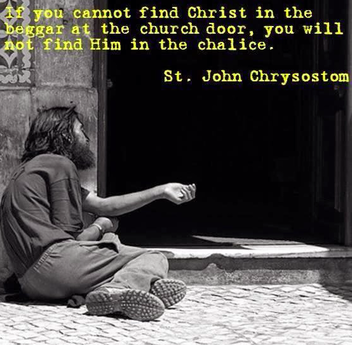 Here's the rub: it's not just simply believing in your heart that God raised Jesus from the dead and confessing that Jesus is Lord, but with whom you are believing and confessing together with that matters. There is a remarkable interchange between Aslan and one of the children getting ready to embark on a dangerous, yet important journey. In C.S. Lewis’ The Silver Chair, Aslan, the Christ-like figure in the story, is speaking rather seriously to Jill. It was important, crucial for her to remember these signs that will guide her on her perilous quest to rescue the Prince Rilian. She must cling to Aslan’s words and follow the signs that he gave her: . . . first, remember, remember, remember the signs. Say them to yourself when you wake in the morning and when you lie down at night, and when you wake in the middle of the night. And whatever strange things may happen to you, let nothing turn your mind from following the signs. And secondly, I give you a warning. Here on the mountain I have spoken to you clearly: I will not often do so down in Narnia. Here on the mountain, the air is clear and your mind is clear; as you drop down into Narnia, the air will thicken. Take great care that it does not confuse your mind. And the signs which you have learned here will not look at all as you expect them to look, when you meet them there. That is why it is so important to know them by heart and pay no attention to appearances. Remember the signs and believe the signs. Nothing else matters. Remember the signs. True, our text, Romans 10:5-13, is not explicitly about signs . . . but it is, actually, in the two marks of faith, signs if you will, that are given: believing and confessing. Signs that signify! My parallel in using Aslan’s words to Jill in Lewis’ The Silver Chair also isn’t apparent . . . so let me explain before we get to the text itself. First, believing and confessing are indeed the marks (signs) of a believing community and these signs are true and should be true of the house-churches in Rome:
These are the two signs—they are clear on the mountain top (that is, in theology and, perhaps, in our belief systems), but they won’t be so clear in the thick air of the valley (in the mundane and crises of life). The two signs: believing God raised Jesus from the dead and confessing that Jesus is Lord. Sounds so easy. So simple. Especially while we are living and breathing in a nation and within a place and time when church seems so normal, ordinary, and natural, and pretty easily defined. But, actually, not so much. Certainly not so easy in that first setting, the city capital of the world, Rome. Believing that God raised that traitor—that man who was crucified on that Roman cross. Being raised from the dead was incredibly naïve and ridiculously dangerous in an Empire where people stayed dead once they were declared guilty of treason and put to open shame on a Roman cross. And, confessing this One raised from the dead—confessing out-loud, in public setting like a supper, in the lifting of that fourth cup at that supper meal—that Jesus is Lord is not only scandalous, it was treason against Caesar (for he was to be confessed as Lord). This believing and confessing was dangerous—and if you didn’t see this and hear this believing and confessing happening, well, it wasn’t church. It wasn’t a church at all. This is one certain place where the Christian life cannot, biblically, be lived apart from a local, concrete, embodied group of believers--a church. A “confessing” Christian simply cannot confess apart from others, others who are seated around that table. In fact, there is no believing without confessing and there is no confessing without being a part of a local, concrete body of believers--a local gathering, a church. We are believing, not as individuals, not as disembodied, church-less Christians, but as confessing Christians, together confessing that Jesus is Lord . . . and who is around this table, that is, who is supposed to be around that table? Paul's list: the elite-Greek, Barbarian, Jew, the educated and the uneducated . . . this is Paul’s point to the house-churches in Rome (cf. Romans 1:14-15)—this is Paul’s point to us in Romans 10:9-13: because, if you confess with your mouth that Jesus is Lord and believe in your heart that God raised him from the dead, you will be saved. For with the heart one believes and is justified, and with the mouth one confesses and is saved. For the Scripture says, “Everyone who believes in him will not be put to shame.” For there is no distinction between Jew and Greek; for the same Lord is Lord of all, bestowing his riches on all who call on him. For “everyone who calls on the name of the Lord will be saved.” Why is there no distinction between Jew and Greek? Why is there no distinction between the Jew and the elite-Greek, the barbarian, the educated and the uneducated (cf. Romans 1:14), because God’s solution to our sin is not out of reach for anyone. Why is it found in our believing that God raised Jesus from the dead and by us confessing that Jesus is Lord . . . why? . . . because “everyone who calls on the name of the Lord will be saved.” Everyone—the elite-Greek, barbarian, Jew, the educated and uneducated. (Feel free to translate that string into today’s population, social, and cultural, dividing, and separated demographics.) While we often use this text—and the next regarding sending preachers (10:14ff.)—as “witnessing” texts, evangelizing texts, they are not used in this way here in Romans 10 nor are they used for the house-churches in Rome to evangelize; but to help promote unity among the house-churches in Rome . . . how so? First, the unwelcomeness (Romans 14-15) among the house-churches in Rome between classes of people (social and cultural), it disavowed, negated what Paul has written about, namely, that “everyone who calls on the name of the Lord will be saved” We, too often, gather in worship together like NOT EVERYONE who calls upon the name of the Lord will be saved . . . it looks like, in our gathering as church, in our supper-room, around the table, that only “our kind,” only our friends and peers, only those in our political party, only those we’d want our children to marry, only those on this side of the rail-road tracks (as it were), this side of town . . . only these are the “who call upon the name of the Lord who will be saved.” This is the context and purpose of Romans, and is a fair and appropriate reading of the significance of Paul’s words concerning “believing” and “confessing.” The early church would not have had to fence the table and, in fact, we do not see them doing that amid the New Testament testimony. Strangely, most of the supper-rooms where the first Christians gathered would have been public or at least semi-public where outsiders could see and hear what was happening, and see who was sitting next to whom . . . and, thus, to participate in the Lord’s supper, surrounded at that table by fellow-Jesus-followers from differing classes, genders, age groups, slaves and masters, even children would have been crazy unless one actually believed that God raised Jesus from the dead; for you were confessing with these strangers and unequals that Jesus, not Caesar, was Lord. This crazy mixed company of peoples, believing and confessing together was the sign that it was all true—the gospel and the church were all true.
0 Comments
 "Therefore welcome one another as Christ has welcomed you, for the glory of God" (Ro 15:7). This is church language. A gathered-church. The context: Some were NOT welcoming others. So the word to church: "welcome those whom you are not welcoming." Negative application: What are our attitudes and actions NOW that communicate "you're unwelcome here" or prohibit the welcome of those we are not welcoming (those not like us/those we hate/those we in-some-way-look-down-upon)? Discover, lament, repent. Positive application: Intentional action that welcomes those unlike us whom we are not currently welcoming. My theology and understanding of the New Testament brings me into places and near people that I, otherwise, probably would not be. Sometimes this scares me, not because I am uncomfortable (and I am often uncomfortable as I should be or I am not learning from my theology and understanding of the New Testament), but because I am empty of solutions or resources or practical-on-the-spot comfort.
Children's message at service yesterday:
Kids, I want to ask you a question (like I usually do), but I want you to pause and really think about your answer. When you walk into a room, into a home, into a party, into any place where there are other people (your age), what's the first thing you ask yourself? Of course I spent a little time explaining what "ask yourself" means because they don't even know they are "asking" anything. Had plenty of puzzled looks for the most part . . . but I knew they'd get it when I told them what I thought their first question to themselves would be . . . I said, "When you walk into a room, into a home, into a party, into any place where there are other people (your age), don't you ask yourself, 'Are my friends here?' (Parents, don't we even ask this?)" You can see their minds work by their eyes and facial expressions. O yeah! Lots of nodding yes. They got it . . . so did the adults . . . Of course I said this is natural and not a bad thing . . . but that can stop us from asking other questions like, who is lonely here, who is not liked and needs a friend, who is uncomfortable here and needs someone to talk to . . . This is what Jesus did for us: he came into the party, knowing full well he didn't have any friends there, and asked, "Who is lost? Who needs a friend?" This is church, people (now I'm not talking to the kids, but you, blog friends). Maturing in Christ means getting beyond "who are my friends?" and "are my friends here?" And this is also about maturing as a church, as a gathered-church. |
AuthorChip M. Anderson, advocate for biblical social action; pastor of an urban church plant in the Hill neighborhood of New Haven, CT; husband, father, author, former Greek & NT professor; and, 19 years involved with social action. Archives
February 2024
Categories
All
|
Pages |
More Pages |
|
 RSS Feed
RSS Feed